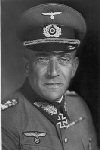Nikolaus von Falkenhorst was born January 17, 1885 in Breslau, Silesia in Germany. He grew up in a typical family steeped in Prussian military tradition. He took military training and enlisted in the army in 1903 in the rank of reserve officer in the 7th Grenadier Regiment. He joined the General Staff as early as 1904. During World War One he served in various units, holding various ranks.
After the war he saw action in Finland against the Bolsheviks during the Finnish civil war. On his return to Germany he was automatically incorporated in the Reichswehr. Between 1925 and 1927, he was posted to the Operational Staff of the Department of Defense. October 1, 1932 saw him promoted to Oberst and between 1933 and 1935, he served a military attaché in respectively Prague, Belgrade and Bucharest.
He was promoted to Generalmajor on August 1, 1935 and appointed Chief of Staff of 3. Armee in Dresden. He was commander of the 32.Division in Keslinn from 1936 to 1939 and promoted to Generalleutnant in 1937.
At the time of the invasion of Poland, Von Falkenhorst was in command of XXI.Armeekorps and received his promotion to General der Infanterie. Following the invasion of Norway he was promoted to Generaloberst on July 19, 1940. He was formally appointed commander of the Armee Oberkommando Norwegen as per July 25, 1940. He received a special order at the start of Operation Barbarossa. He and his Lapland Armee were to capture the city of Murmansk in Operation Silberfuchs (Silver fox). The operation, launched on June 29, 1941 ended in failure. Until his discharge on December 17, 1944, Von Falkenhorst was Commander-in-Chief of all German forces in Norway. His discharge was caused by his open criticism of the policy of Reichskommissar Terboven. Although Von Falkenhorst followed Hitler’s orders as to the treatment of captured British commandoos to the letter, on the other hand he felt uneasy about the way Terboven wished to deal with the Norwegian population. This criticism and his failure in Finland with his Lapland Armee ultimately led to his discharge. He was replaced by Generaloberst Rendulic.
Von Falkenhorst was known as a ruthless commander. On his orders, captured British commandoes were handed over unconditionally to the Gestapo in order to be shot. For his blindly following orders from higher authorities, Von Falkenhorst was sentenced to death by a British military court in 1946. Later on this sentence was revised to 20 years imprisonment. He was released on July 13, 1953 for medical reasons. Nikolaus van Falkenhorst passed away on June 18, 1968 in Holzminden.
Definitielijst
- invasion
- Armed incursion.
- Regiment
- Part of a division. A division divided into a number of regiments. In the army traditionally the name of the major organised unit of one type of weapon.
- Reichskommissar
- Title of amongst others Arthur Seyss-Inquart, the highest representative of the German authority during the occupation of The Netherlands.
- Reichswehr
- German army during the Weimar republic.
Information
- Article by:
- Wilco Vermeer
- Translated by:
- Arnold Palthe
- Published on:
- 19-01-2025
- Feedback?
- Send it!










